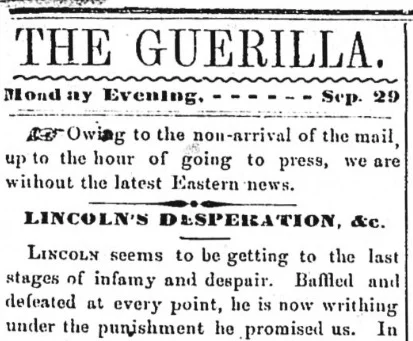The Guerilla: A Confederate Occupation Newspaper
/In September, 1862, the Confederacy invaded the Kanawha Valley of western Virginia. The Confederate army of some 5,000—including many Virginians who hailed from the western region of their state—fought a series of engagements with their Union foes, culminating in the capture of Charleston.
The fall of Charleston provided an opportunity for pro-Confederate sentiments to reemerge in the public sphere. Within two weeks of the Rebel army’s appearance, the pro-Confederate newspaper The Guerilla began circulating the streets of the town. Published daily by “Associate Printers” for the duration of the short-lived Confederate occupation, the two extant copies of the Guerilla shed light on the nature of the Civil War in West Virginia and the short-lived Confederate occupation of the Kanawha River Valley…
Read More






